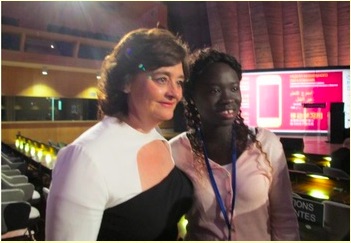.. WOMEN’S EQUALITY ..
an article by A. D. McKenzie, Inter Press Service News Agency (reprinted by permission and abridged)
Providing women with greater access to mobile technology could increase literacy, advance development and open up much-needed educational and employment opportunities, according to experts at the fourth United Nations’ Mobile Learning Week conference [in Paris].
For Cherie Blair (left), founder of the Cherie Blair Foundation for Women and wife of former British Prime Minister Tony Blair, “empowering women and girls to access education isn’t an option, isn’t a nice thing to do, it’s an imperative”. Credit: A.D. McKenzie/IPS
Click here to enlarge photo
“Mobile technology can offer learning where there are no books, no classrooms, even no teachers. This is especially important for women and girls who drop out of school and need second chances,” said Phumzile Mlambo-Ngcuka, Executive Director of UN Women.
The agency, which focuses on gender equality and the empowerment of women, joined forces with its “sister” organisation, the U.N. Educational, Scientific and Cultural Organisation (UNESCO) to host the Feb. 23-27 conference this year.
The aim, UNESCO said, was to give participants a venue “to learn about and discuss technology programmes, initiatives and content that are alleviating gender deficits in education.”
Participants from more than 70 countries shared so-called best practices and presented a range of initiatives to address the issue, including reducing the costs of access to mobile services in some developing countries, and providing training and free laptops to women teachers in countries such as Israel.
“There is still a persistent gender gap in access to mobile technology,” said keynote speaker Cherie Blair, founder of the Cherie Blair Foundation for Women and wife of former British Prime Minister Tony Blair.
In an interview on the side-lines of the conference, she told IPS that “anything that encourages the education of girls is important” and that it was “particularly significant” that UNESCO and UN Women had joined forces to work together in this area to achieve results.
“We need to encourage women to use technology and we also need to involve men to provide support,” Blair said. She cited research showing that a woman in a low- or middle-income country is 21 percent less likely than a man to own a mobile phone. In Africa, the figure is 23 percent less likely, and in the Middle East and South Asia 24 percent and 37 percent respectively.
“The reasons women cite for not owning a mobile phone include the costs of handsets and data plans, lack of need and fear of not being able to master the technology,” Blair said.
Yet, according to the International Telecommunications Union (ITU), mobile phones are the “most pervasive and rapidly adopted technology in history”, with six billion of the world’s seven billion people now having access.
If there existed gender parity in this access, women could benefit from the technology in a number of ways, including getting information about healthcare and other services, experts said. . .
Both UNESCO Director General Irina Bokova and Cherie Blair described education as a “human rights imperative” as well as a development and security imperative.
They stressed that the goal of achieving gender equality in education will continue for the post-2015 development agenda, and that technology has an important role to play. “Empowering women and girls to access education isn’t an option, isn’t a nice thing to do, it’s an imperative,” Blair said.
[Thank you to Janet Hudgins, the CPNN reporter for this article.]
